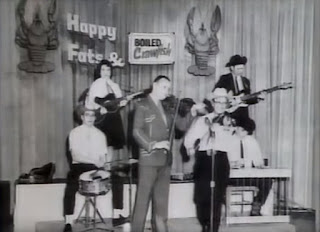Jeunes gens de la campagne,
Marriez donc jamais vous-autres,
Une fille c'est une amusée,Mais une femme c'est un embarras.Jeunes gens de la campagne,Écoutez donc z-un bon conseil,Une fille c'est une amusée,Bien une femme c'est un déshonneur.Jeunes gens de la campagne,Marriez donc jamais vous-autres,Une fille c'est une amusée,Mais une femme c'est un embarras.Jeunes gens de la campagne,Écoutez donc z-un bon conseil,Une fille c'est une amusée,Bien une femme désagréable.
 |
| KLFY TV Station, 1966 Happy Fats' "Boiled Crawfish" TV show Abe Manuel Sr. (bottom right) |
His first recording stint came with backing up Jelly Elliot in 1949 however, by 1954, he had formed his own group called the Louisiana Hillbillies. Recorded in 1954, "Country Gentleman" (#1086) is a swingy, hillbilly version of the old melody "Jeunes Gens de la Campagne (Young Men From The Country)". It was first recorded by Dennis McGee & Ernest Fruge in 1929 and had been the original source for Joe Falcon's 1928 recording of "Allons A Lafayette".
Young gentlemen of the countryside,
Never get married,
A girl is playful,But, a wife is a bother.Young gentlemen of the countryside,Listen to good advice,A girl is playful,Well, a wife is dishonorable.Young gentlemen of the countryside,Never get married,A girl is playful,But, a wife is a bother.Young gentlemen of the countryside,Listen to good advice,A girl is playful,Well, a wife is disagreeable.
For years, Abe would travel around Louisiana and Texas, singing both country and Cajun tunes, working with a slew of different musicians, even with Hank Williams. He recalls:
Working with Hank Williams was something else, particularly the night in 1948 when he kicked out the front windshield of my Buick after we'd finished playing a date down in Louisiana. Hank had been drinking. He kicked out my window, but he never let liquor cause him to not finish a song or performance. If he showed up, he did the songs right.1
- Louisiana Fiddlers By Ron Yule
- Lyrics by Stéphanie D, Stephane F and Marc C
Find:
Acadian All Star Special - The Pioneering Cajun Recordings Of J.D. Miller (Bear, 2011)













